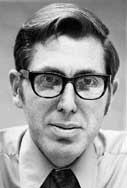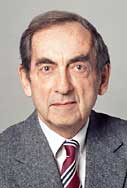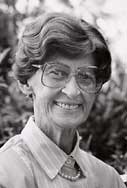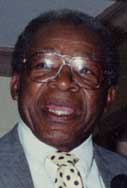Robert J. Harris
Robert J. Harris, emeritus professor of law, was known for his energy and enthusiasm working at the Law School and with the city of Ann Arbor.

Harris, a full-time member of the Law School faculty from 1959-74 and an adjunct professor for many years, died July 9. He was 74.
Colleagues describe Harris, who also served as Ann Arbor mayor from 1969-73, as caring and civic-minded. “He spent a lot of time talking to me about current events, such as fair housing and racial integration,” says Rick Hills, a law professor who knew Harris for 12 years. “I thought he had more energy than some of my colleagues. I was impressed with him.”
Harris’s tenure as mayor came during turbulent times. Faced with protests against the Vietnam War, he worked with activists and University and city officials to keep the demonstrations peaceful and the city safe.
Ted Stanton, emeritus professor of law, taught the same course on first-year contracts when he arrived at the Law School in 1965. Harris gave Stanton course outlines and offered him teaching tips, such as “don’t hesitate to confess ignorance if you don’t know the answer. Be honest with the students.”
“He emphasized not the substance of the material, but organizing it so it comes across clearly and with flair,” Stanton says.
Harris was born Oct. 5, 1930, in Boston. He graduated Phi Beta Kappa from Wesleyan University and was a Rhodes Scholar. At Yale Law School, he was a member of the Law Review and the Order of the Coif, an honorary scholastic society. He served in the Army for two years during the Korean War, and moved in 1959 to Ann Arbor where he served as an attorney, in addition to his service as a law professor and mayor.
Harris served on many community boards and was a founding member of Friends of Legal Aid, which provides support to Legal Services of South Central Michigan. He also did extensive pro bono work for indigent individuals and for numerous groups, including Ozone House, Perry Nursery School and S.O.S. Community Services.
In his retirement, Harris tutored children in reading and volunteered for Food Gatherers. He also had a passion for model airplanes and jazz.
Survivors include his wife of 52 years, Mimi; children David of Ann Arbor; Liz (Lorn Gingrich) of Albany, N.Y.; and Kate (Peter Bullard) of Chelsea, Mich.; three grandchildren, Devon, Rachel and Sophia; brothers-in-law Dick Porter of Upper Jay, N.Y.; Herb Rueben of White Plains, N.Y.; and Sam Rosenfeld of Washington, D.C.; seven nephews, two nieces and his sisters-in-law.
A memorial service was held July 13 in Ann Arbor. Donations in his honor may be sent to Friends of Legal Aid, 420 N. Fourth Ave., Ann Arbor, MI, 48104.
Harold Stevenson
Harold Stevenson, a retired psychology professor and former Guggenheim fellow who developed the psychology department’s relationship with China, died July 8 in Palo Alto, Calif., after a long illness. He was 80.

In 1973, Stevenson traveled to China as part of the first delegation of foreign researchers to visit the country a year after Richard Nixon’s historic trip. He began to conduct significant cross-cultural studies of children’s academic achievement in the United States, Asia, Latin America and Eastern Europe.
Richard Gonzalez, chair of the Psychology Department, recalls his first trip to China and how Stevenson sought him out and took him under his wing for an afternoon to explain all the unique aspects of Chinese culture he’d learned over many years.
“He was the one who brought cross-culture interests to developmental psychology,” Gonzalez says. “For years, development psychology looked at development in the U.S., but his awareness grew when he made one of the first cross-cultural exchanges to China.”
He helped establish exchange programs between Chinese and U.S. scholars and founded a collaborative research center between
U-M and the Chinese Academy of Sciences.
Prior to joining the U-M faculty, Stevenson was director of the Institute of Child Development at the University of Minnesota, which achieved international recognition in the area of educational research for children.
Stevenson helped found nursery schools in Texas, Minnesota and Michigan designed for the children of graduate students in education and psychology. Stevenson and his wife, Nancy, a clinical psychologist, established one of the first racially integrated preschools in the country in the early 1950s in Austin, Texas.
Stevenson served as president of the Division of Developmental Psychology of the American Psychological Association, and the International Society for the Study of Behavioral Development. He also was director of the Child Development and Social Policy program at U-M.
A fellow at the Center for Advanced Study in the Behavioral Sciences in Palo Alto, he also was a fellow of the American Academy of Arts and Sciences and chairman of the Council for International Exchange of Scholars Committee on Psychology.
He chaired or was a member of many national boards and committees, including those advising the National Institute of Child Health and Human Development, the National Institute of Mental Health, the National Academy of Sciences-National Research Council, and the visiting committee for the School of Education at Harvard University.
Stevenson wrote and edited numerous books and manuscripts, including “The Learning Gap: Why Our Schools Are Failing and What We Can Learn from Japanese and Chinese Education,” with James Stigler, in 1992.
He received a bachelor’s degree from the University of Colorado and master’s and doctoral degrees in psychology from Stanford University. Stevenson served in the Navy during World War II, where he studied in the Japanese language program.
Stevenson is survived by his wife, Nancy Guy Stevenson; four children, Peggy Stevenson of Palo Alto; Janet Zimmerman of Plymouth, Mich.; Andy Stevenson of Charlottesville, Va.; and Patricia Stevenson of Chicago; seven grandchildren; a brother, Robert Stevenson of Post Falls, Idaho; and seven nieces and nephews.
A memorial service will be held in late August in Ann Arbor. The family hopes to establish a fund in Stevenson’s memory, through the Society for Research in Child Development, to support international study and research in developmental psychology.—Joe Serwach, News Service
Ruth Harris
Ruth Harris, professor emerita of kinesiology, died May 27 at the Ann Arbor Hospice. She was 85.

Harris taught in the Division of Kinesiology from 1946-87. She continued her affiliation with the division after her retirement as an ex-officio member of the Kinesiology Alumni Society (KAS) Board. She received the KAS Lifetime Alumni Achievement Award in 1999, given to an individual whose service to Michigan Kinesiology has enhanced and changed the division over time.
Beverly Ulrich, dean and professor of kinesiology, says Harris’s students remember her with fondness and respect, and say she provided challenges that were creative and pointed.
“Ruth cemented her link with the Division Kinesiology when, upon her retirement, she established a Merit Award Fund for outstanding doctoral-level graduate students, which has grown into the Ruth Harris Endowment Fund and has supported many deserving and grateful students,” Ulrich says. “She was a very special friend to many, and we will miss her dearly.”
Throughout her career, Harris received numerous honors related to education, to her service with the American Red Cross, and to her work with the underprivileged.
She served on the governing boards of several professional organizations, including the American Alliance for Health, Physical Education, Recreation and Dance, and the National Association for Physical Education of College Women. She was a charter member of the International Society of Biomechanics, and she was active with the American Red Cross.
Harris received her bachelor of arts degree from Brown University in 1941; a master of science from Wellesley College in 1943; and a doctorate from New York University in 1970.
Survivors include two brothers, Walter Harris of St. Simons Island, Ga., and Herbert Harris, Jr. of Tequesta, Fla.; several nieces and nephews, and grand nieces and grand nephews; and her housemate of 50 years, Professor Emerita Joan Farrell.
A memorial service was held June 1 at First Baptist Church in Ann Arbor.—Cheryl Israel, Division of Kinesiology
Joseph Vaughn
Joseph Vaughn, professor emeritus of kinesiology/physical education, died July 16 in Wilmington, N.C. He was 81.

Vaughn taught for the Division of Kinesiology/Physical Education from 1970-84, when he retired and was given emeritus status. He went on to serve as chair of the physical education department at Grambling State University before returning to U-M. From 1986-96 he held appointments with the Department of Gerontology, School of Education, Physical Education and LSA.
Vaughn made many contributions to the Ann Arbor community, among other things, with his work on the Ann Arbor School Board. He was an active participant in several state and national organizations, including the American Alliance for Health, Recreation, Physical Education and Dance, the American Association of Leisure and Recreation, and the American Public Health Association.
Kinesiology Professor Dee Edington says Vaughn was an outstanding leader in physical education in the area of recreation for the handicapped and physical activity for the aged. His many interests and leadership activities laid the foundation for several departmental programs.
Vaughn received a bachelor of science degree from Fisk University in 1948, a master of arts from Columbia University in 1949, and a doctorate from Springfield College in 1968.
Vaughn is survived by his wife, Frances H. Vaughn; children Laura Lynn Vaughn-Allen of Wilmington; Joseph E. Vaughn III and Celeste Brown of Las Vegas; Kenneth Vaughn of San Diego; and five grandchildren.
Contributions may be made in his name to Fisk University, General Scholarship Fund, Advancement Office, 1000 17th Avenue North, Nashville, TN, 37205.
A memorial service will be held in Ann Arbor at a future date.—Cheryl Israel, Division
of Kinesiology

